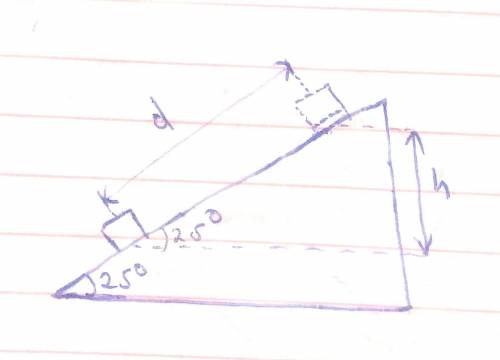
Physics, 19.03.2020 20:38 edwardordonez66
An ice cube of mass 50.0 g can slide without friction up and down a 25.0 degree slope. The ice cube is pressed against a spring at the bottom of the slope, compressing the spring 0.100 m The spring constant is 25.0 N/m When the ice cube is released, how far will it travel up the slope before reversing direction?
Notice that all the initial spring potential energy was transformed into gravitational potential energy. If you compressed the spring to a distance of 0.200 m, how far up the slope will an identical ice cube travel before reversing directions?

Answers: 2
Another question on Physics

Physics, 22.06.2019 04:20
Calculate the capacitance of a system that stores 2.0 x 10^-10c of charge at 100.0 v. use c=q/v. a. 2.0 x 10^-12 f b. 2.0 x 10^-8 f c. 5.0 x 10^11 f d. 5.0 x 10^7 f
Answers: 1

Physics, 22.06.2019 04:30
Work out sian speed for the first 30 minutes of her journey. give your answer in km/h.
Answers: 1

Physics, 22.06.2019 14:40
How does an observation about an object differ from an inference about that object
Answers: 1

Physics, 22.06.2019 21:00
On a mild saturday morning while people are working inside, the furnace keeps the temperature inside the building at 23degreesc. at noon the furnace is turned off, and the people go home. the temperature outside is a constant 16degreesc for the rest of the afternoon. if the time constant for the building is 3 hr, when will the temperature inside the building reach 18degreesc? if some windows are left open and the time constant drops to 2 hr, when will the temperature inside reach 18degreesc?
Answers: 3
You know the right answer?
An ice cube of mass 50.0 g can slide without friction up and down a 25.0 degree slope. The ice cube...
Questions





History, 25.01.2021 20:20


Geography, 25.01.2021 20:20


Chemistry, 25.01.2021 20:20

Mathematics, 25.01.2021 20:20


Spanish, 25.01.2021 20:20

SAT, 25.01.2021 20:20

History, 25.01.2021 20:20

Mathematics, 25.01.2021 20:20

Advanced Placement (AP), 25.01.2021 20:20




Mathematics, 25.01.2021 20:20

 , b)
, b) 








